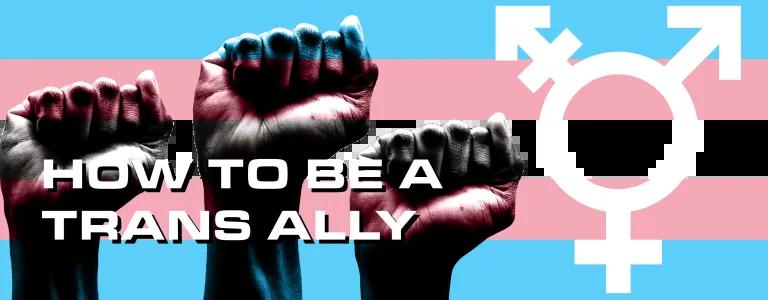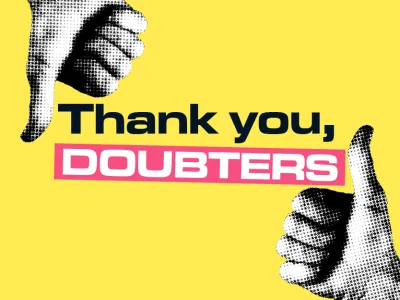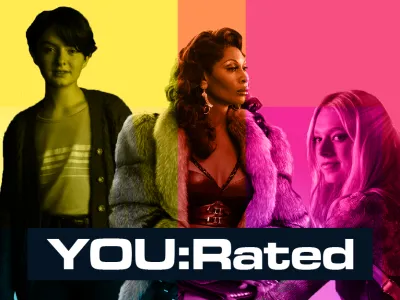
How To Be A Trans Ally, By Mermaids
By Mermaids, who have been supporting transgender, nonbinary and gender-diverse children, young people, and their families since 1995. This is what they have to say about how you can be a great trans ally...

When someone tells you they’re trans or nonbinary, it’s important to understand that they’ve taken a huge step in their life. Support is important to everyone, especially people who have just come out.
First of all, you don’t have anything to worry about, they are still the same person! Try to use whichever name and pronouns (he/she/they etc) they ask you to use, as these can be very important for their happiness and self-confidence.
Don’t be afraid to ask questions, but you should also understand that these things are very personal and they may not want to answer.
Gender is a broad spectrum, full of different terms and interpretations. Digging through all these new labels can be overwhelming for you or the person you’re supporting, but it’s an incredibly rich world to explore. An important thing to remember is that gender identity and gender expression can look very different from the outside. It’s like if your favourite colour is green, but you have a wardrobe full of different colours and shades. Your favourite colour hasn’t changed, but maybe today your jumper is purple, or your nails are painted yellow.
So what’s the first big step to becoming a good ally? Just listen! A lot of the work is in listening, but that’s great because it means you can be exactly what your friend or family member needs. By listening to what they tell you they need, you won’t have to make any guesses.
Articles like this are a wonderful start, because you’re already starting to seek out information without going to somebody directly with questions that they themselves might not have the answers to yet, or may find too personal to disclose. No single person can be a spokesperson for a whole community, but there are plenty of resources out there for you. You can start right here on the Blog with the LGBTQ+ History By The Decade series, or pop over to Mermaids for our resource pages.

If you already knew this person before they came out to you, then you probably knew them by a different name previously. Their birth name is like a secret, one that isn’t yours to tell if somebody else asks. The simple reason for this is to show that you respect their identity. Most of us know what we were almost called before our parents settled on our birth name, but it doesn’t have any bearing on who we are today. All that matters now is the name you’ve been introduced to.
There’s a chance that your friend or family member hasn’t settled on a new name yet. In this case, keep an open dialogue about it, and offer to trial a few names between you until one feels right to them. This is a good time to remember that you may be one of very few people who know about this, and it’s important to ask how they want to be referred to around others. Coming out as trans can feel very scary, and it’s vital that you help them to feel safe, rather than letting them worry that you’ll tell somebody without their permission.
So we’ve covered the basics regarding how to directly support somebody who is trans, but that’s only part of it in your new role as a trans ally! You’ve got all this information now, and it’s a great idea to share it with other people, and create conversations that champion equality. It can be exhausting for trans and nonbinary people to constantly explain who they are, so it means a great deal to have someone else speak up against prejudice or insults.
A quick and easy way to show your support for trans people online is to include your pronouns somewhere on your social media profile. The main goal here is to normalise everybody including their pronouns, so that trans people aren’t as singled out by their necessity to do so. It also encourages people to never assume, since there is no single way to look trans or nonbinary.

Ultimately, there’s a lot to adjust to, and nobody is expecting you to get everything right the first time. If you make a mistake with somebody’s name or pronoun, that’s okay! Apologise once, correct yourself, and move on. The longer a conversation is held up by apologies and regrets, the more uncomfortable everybody involved becomes. If it happens often, and you start to feel really bad about it, you can spend some time alone practicing talking about the person with their correct name and pronouns until it becomes a bit smoother. There’s also nothing wrong with taking a brief pause when speaking to others to make sure you say the right thing. That’s going to be faster than making a mistake and then trying to fix it!
Once you’ve got the hang of things, supporting trans and nonbinary people becomes a lot like just being a good friend. If a friend is upset, you try to help them feel better. If a friend falls over and scrapes their knee, you make sure they get a plaster. If a friend comes out as trans, you let them know you’re a safe person to talk to.
To find out more about Mermaids and what they do, head to their website.
Include this article in your Skills Builder Journal. It could help you develop... 





